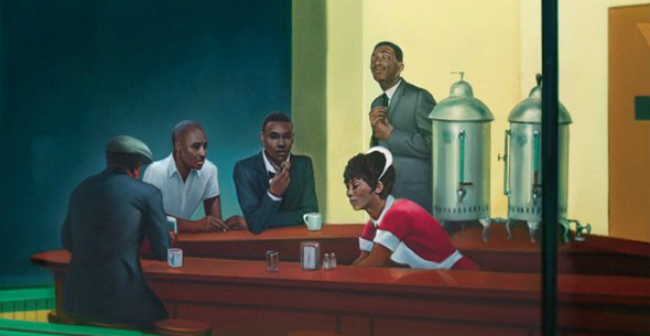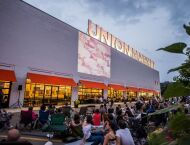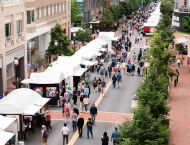Culture
 Illustration: Courtesy of Arena Stage
Illustration: Courtesy of Arena Stage
Actor Carlton Byrd on Two Trains Running
March 19, 2018 @ 12:00am
In 1992, August Wilson’s Two Trains Running premiered on Broadway. It was, at the time, the latest in his The Pittsburgh Cycle – his take on documenting and portraying Black American life, decade after decade. Two Trains Running explores the 1960s in the rapidly changing neighborhood of the Hill District, a historically black neighborhood in Pittsburgh, Pennsylvania; more specifically, in Memphis Lee’s diner – a place soon to be wiped out thanks to something we now know as gentrification. Now, the play comes to the Arena Stage on March 30 amidst a political and social backdrop nearly 50 years after the events of the story. And yet, the events still echo the tumultuous time outside the doors of Memphis Lee’s diner.
Carlton Byrd makes his Arena Stage debut as Sterling, a man recently released from the state penitentiary and in search of work who arrives at the diner eager to ask Risa, the one female character in the play, out on a date. On Tap got a chance to speak with Byrd ahead of his DC performance about the legacy of August Wilson’s work, returning to the DC theater scene and how Two Trains Running still rings true.
On Tap: What’s it like being back in DC’s theatre scene?
Carlton Byrd: It’s great. [The] first time I was in DC was for Woolly Mammoth’s production of Antebellum the day before Obama’s inauguration, so there was a certain energy to the city then. I’m excited for another chance to perform in DC, this time doing my first August Wilson.
OT: What drew you to Two Trains Running? Are there any similarities between you and Sterling, the character who you’re portraying? Do you know people like Risa and the other characters in real life?
CB: I was drawn to Two Trains because it’s a great play with great characters done by a great playwright. August Wilson writes in a way that is authentic to the African-American experience in this country. I know dozens of people who are similar to the characters in this play; some of them are in my family. As for myself and Sterling, I find similarities between myself and every character I portray. The work then becomes finding how we are different. That’s where the acting begins.
OT: Seattle is a very different environment from DC. Does the environment that you’re performing in affect your approach to the performance? How will the DC production be different or similar to the Seattle Repertory production?
CB: I approach every performance the same [way]. It doesn’t matter where I’m performing, within what medium or in front of what group of people. [It] doesn’t matter if my mother is in the audience, some celebrity or a total stranger – the work and my work ethic are the same. Our DC run will be different because we have had time to settle deeper into our characters and learn from each other during our Seattle run. Also, the performance will now be restaged for the round. That’s a big difference.
OT: How is this play still relevant to today, specifically to a place like DC that’s undergoing massive gentrification? And in the background, we have events like what happened in Charlottesville and the Parkland, Florida school shooting – events also tinged with racial violence and tension.
CB: The play takes place in May of 1969 in the days leading up to Malcolm X’s birthday. I feel that most Americans like to gloss over Malcolm X’s contributions to empowering black people and providing in many ways the precursor for the Black Power Movement, which has been unfairly demonized through the rewriting of American history. Malcolm’s ideals and the Black Power Movement take center stage throughout the play with the character of Sterling. The play still rings true because many of the same issues are happening today. When the play speaks to specific instances of police brutality, gentrification, racism and the disenfranchisement of black people, it feels like they are speaking about 2018. The play speaks of people in transition; people at a crossroads in their lives. Since the election of 2016, I think our country is in a similar place of transition. And just like our characters, many Americans are tired of simply giving in to various forms of mistreatment – to put it mildly – and writing it off as the status quo. Our characters want to be treated with respect, among many other things. They also want the injustices that have become commonplace in their communities to change as well. I think that sentiment is shared today with the millions pushing for gun reform and the rise of the #BlackLivesMatter and #MeToo movements. Like our characters, people are expressing their need for change. As was true in the 60s, those in need of change in 2018 are willing to fight, picket and protest to obtain it.
OT: What is it about August Wilson’s work that still resonates with modern audiences?
CB: He was a poet and a historian. Great poetry is timeless, and history tends to repeat itself. Thus, by very nature, his plays will continue to be relevant as long as the themes in his plays continue to be present around the world.
OT: What are you most excited about in bringing this production to DC? What do you want audiences to take away from this performance?
CB: I’m always excited to perform. That is a blessing in itself. I look forward to doing my best to tell my portion of the story. Hopefully in doing that with the help of my amazing cast, the audience will get what August wants them to get from the performance. I’m simply at service to the work and his words.
OT: Finally, to end on a lighter note: what is your favorite place or hidden gem in DC?
CB: I’m looking forward to attending the National Museum of African American History and Culture. It will be my first time.
Two Trains Running runs on Arena Stage’s Fichandler Stage from March 30 to April 29. Ticket are available here.
Arena Stage: 1101 Sixth St. SW, DC; 202-488-3300; www.arenastage.org







